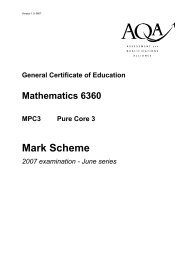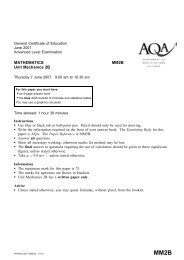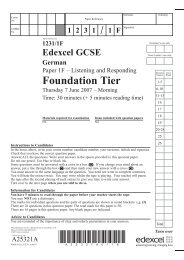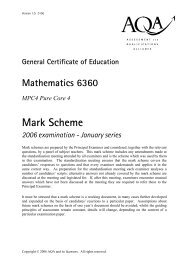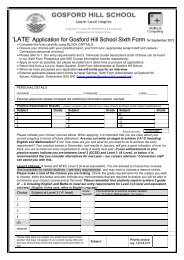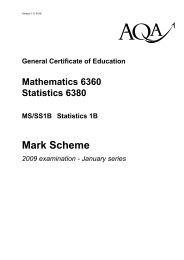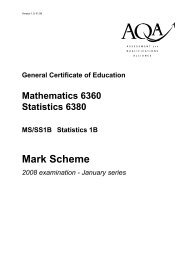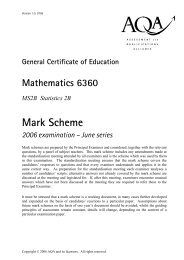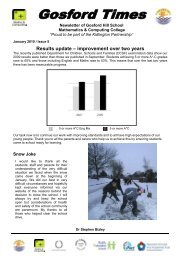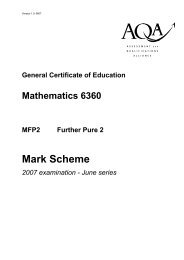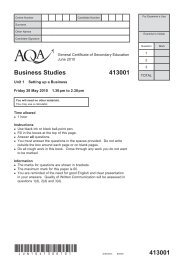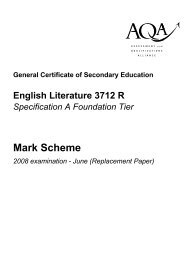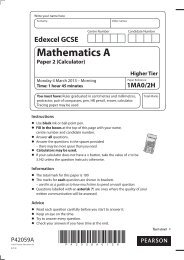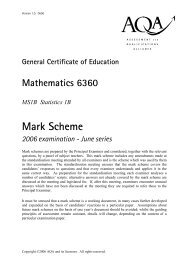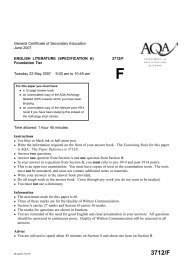Personal Statemnent Workbook - Gosford Hill School
Personal Statemnent Workbook - Gosford Hill School
Personal Statemnent Workbook - Gosford Hill School
Create successful ePaper yourself
Turn your PDF publications into a flip-book with our unique Google optimized e-Paper software.
<strong>Personal</strong> Statement<br />
workbook<br />
Tips on how to improve your university application
<strong>Personal</strong> Statement<br />
workbook<br />
This booklet is designed to help guide you through writing your personal<br />
statement, listing the key information you need to include.<br />
It all seems a little daunting when you first start to write<br />
your personal statement, but once you put pen to paper<br />
you soon realise it’s not; it gets easier. This booklet is<br />
packed with hints and tips on what needs to be included<br />
to help you get those university offers.<br />
Your personal statement is your chance to demonstrate<br />
who you are and why you are a suitable applicant to your<br />
chosen universities and their courses. You can’t spend<br />
too much time preparing your personal statement.<br />
Universities receive thousands of applications every year<br />
and the personal statement can be used as a tool for<br />
selection. This is your opportunity on the application<br />
form to make yourself stand out from other applicants,<br />
therefore it’s crucial that you put the effort into producing<br />
an outstanding statement to ensure you get offered a<br />
place on your chosen courses.<br />
Below: a Computer Games Design student<br />
The University Law Library<br />
Getting started<br />
When writing your personal statement, keep it clear and<br />
concise. Within your personal statement you only have:<br />
• 47 lines<br />
• 4000 characters (not words)<br />
It may sound like plenty of space but you will find, as you write,<br />
it fills very quickly. Therefore, you need to ensure your key<br />
points stand out without repetition.<br />
Points to include<br />
Discuss your chosen Course<br />
Explain why you chose the course/s. Admissions tutors suggest,<br />
overwhelmingly, that they want students to show enthusiasm<br />
about the subjects they want to study. Think about why this<br />
subject interests you and explain in detail.<br />
• Is it a direct path to your chosen career? You may<br />
want to be a teacher and wish to study a degree in<br />
education. It is here that you might talk about your<br />
career aspirations. Why have you chosen to pursue<br />
this career? What has influenced your decision?<br />
• Show you have a good understanding of the course<br />
and you have done your research, for example, you<br />
know what modules you will be studying, any field<br />
trips involved, areas of the course you look forward to<br />
studying, work placement opportunities.<br />
• Why does the subject interest you? Do you want to<br />
gain more knowledge in that area? Is it something you<br />
are passionate about? Are you already studying this<br />
subject, what do you enjoy about it, what skills have<br />
you learnt from it, essay writing, note taking, problem<br />
solving?<br />
• You need to back up your interest by talking about<br />
what you have done to ensure this is the course for<br />
you. Have you read up on the profession, completed<br />
work experience, read additional text outside of the<br />
classroom?<br />
• This may be a problem for those students who have<br />
opted for a diverse range of courses. However,<br />
advice from admissions tutors suggests you refer to<br />
each subject detailing why you are interested and<br />
how they are relevant subjects to your experience.<br />
• If you are applying for a deferred entry then you<br />
might try to explain what you intend to do in the year<br />
between finishing your course and entering University.<br />
An Advice Work lecture<br />
3
Media Production student<br />
Show that you have<br />
skills suited to<br />
university life<br />
It is useful to show an admissions tutor that you have what it<br />
takes to survive the university experience. Probably without<br />
realising, you gain skills through your studies and in your own<br />
spare time.<br />
• You may be the Class Rep at school or captain of<br />
a team – this evidence shows responsibility and<br />
commitment.<br />
• You may work part-time – being punctual,<br />
balancing a part-time job with your studies<br />
and social life shows excellent timemanagement<br />
skills. Working part-time develops<br />
communication skills through working with<br />
different colleagues and customers. The role<br />
may be a position of trust, cash handling or<br />
key-holder, being able to work with minimum<br />
supervision and use initiative. What other<br />
activities do you do that help you gain these<br />
skills?<br />
Forensic Science<br />
Show examples of your<br />
personality<br />
Few people are incredibly outgoing, have travelled the<br />
world twice over, been captain of the hockey team and have<br />
completed a period of work experience in exactly the area<br />
suited to their degree/HND.<br />
Be imaginative but honest about the things which you have<br />
experienced and how your interests or responsibilities may set<br />
you apart from other students. Try to be specific by providing<br />
detail or examples.<br />
Think about what you have already achieved and experienced.<br />
The Admissions Tutor will see what kind of person you are and<br />
how you will fit in at university.<br />
• Are you involved in any team sports? How often do<br />
you train? Are you captain? Would you like to continue<br />
this at university through the Students’ Union teams? If<br />
so, have you already looked into this?<br />
To help you get started, fill in the boxes below with information<br />
about yourself that you can include in your personal statement<br />
SUBJECTS – why chosen<br />
SCHOOL/COLLEGE ACTIVITIES<br />
• Are you a volunteer for a charity? Do you help in<br />
your community? Are you a member of the Duke of<br />
Edinburgh’s Award? Have you been involved in the<br />
Prince’s Trust?<br />
• Have you travelled anywhere exciting? How has this<br />
influenced you?<br />
• Do you have any plans for your summer break before<br />
university that may be relevant to your chosen course?<br />
Remember to use this guide to make your <strong>Personal</strong><br />
Statement truly personal so do try to add your own<br />
sentences and do not restrict yourself to the suggestions<br />
made.<br />
You also need to be aware that UCAS has a Plagiarist<br />
Detection Service. This ensures that all statements<br />
are personally written and not copied from previous<br />
applications. Your statement will be checked against a<br />
statement library and web sources. Statements showing<br />
a potential level of similarity of 10% or greater, will be<br />
reviewed by the university and applicants will be notified.<br />
The university then makes the decision whether to<br />
consider the applicant for the applied course or to reject<br />
them.<br />
WORK EXPERIENCE<br />
SOCIAL ACTIVITIES<br />
4<br />
Finally, make sure that your statement is word perfect with no<br />
spelling or grammatical mistakes. Get someone to read through<br />
it with a fresh pair of eyes.<br />
5
Journalism students in the University’s Media Centre<br />
Improving a <strong>Personal</strong> Statement<br />
Part One: The Before Version<br />
The following student has written a <strong>Personal</strong><br />
Statement to support an application to read<br />
History. This is an early draft which needs<br />
improving<br />
I enjoy History lessons so I have decided to pursue the<br />
subject at degree level.<br />
At University I look forward to examining a range of<br />
historical sources. I am particularly interested in French<br />
history and trips to France have broadened my historical<br />
awareness.<br />
As a school prefect I hold many responsibilities<br />
organising and attending school functions, delivering<br />
speeches to the school body, being an active member<br />
of the school council, working effectively with other<br />
students. Having played in school concerts with the<br />
keyboard orchestra when I was in year nine, I have<br />
recently taken up piano lessons.<br />
I am a keen sports player and I am a member of the<br />
school hockey team, netball team, the athletics squad<br />
and the volleyball team, earning me the “Sports<br />
<strong>Personal</strong>ity of the Year” award. I have taught information<br />
technology skills to younger students and helped a<br />
particular student to overcome language difficulties. I<br />
have organised sports days and Christmas parties for the<br />
elderly: and written, directed and performed a series of<br />
short plays.<br />
I have always enjoyed reading but more recently my<br />
‘A’ level studies have enabled me to explore foreign<br />
literature.<br />
Currently, I am involved in the European Youth Parliament<br />
Competition in which I will be representing my school<br />
at a residential debating conference. The winner will<br />
represent the United Kingdom in Cyprus. This venture<br />
enhanced my general knowledge (specifically of genetic<br />
engineering and drug legislation).<br />
6<br />
7
Improving a <strong>Personal</strong> Statement<br />
Part Two: The Improvement made<br />
The <strong>Personal</strong> Statement to read History has been broken down into a series of<br />
paragraphs with the ‘Before’ paragraph and the ‘After’ (or improved paragraph).<br />
Between these two paragraphs is an analysis of the strengths and weaknesses.<br />
Paragraph 1<br />
Strengths<br />
• Does attempt to start with a reason about the choice<br />
of degree<br />
• Each sentence tries to offer a different point<br />
Weaknesses<br />
• A more insightful reason might be used to explain the<br />
choice of course<br />
• Could state what the student wants out of the Degree<br />
• Could mention which areas of history are of interest<br />
• Words such as history are used twice in one sentence<br />
• The last sentence does not make sense as it does not link<br />
the two separate points<br />
Paragraph 2<br />
Strengths<br />
• Being in a position of responsibility is useful to mention (i.e.<br />
A school prefect)<br />
• Examples are provided about the prefect duties<br />
• Provides an image of a student with varied interests (e.g.<br />
music)<br />
• Quite concise about the musical experience<br />
Weaknesses<br />
• No mention of skills gained from being a school prefect<br />
• Problem in relating school prefect to musical Experience: it<br />
needs a phrase to link the two together<br />
• Omit the reference to Year Nine as it seems that the<br />
experience was too long ago to be relevant given the more<br />
recent responsibilities and experiences<br />
• Has learning the piano really sold the student!<br />
Paragraph 3<br />
Strengths<br />
• Presents an image of an active and well-rounded individual<br />
not just academic.<br />
• Valuable to include a reference to IT at some stage<br />
• Assisting other people presents another aspect of the<br />
student’s personality<br />
Weaknesses<br />
• Too many sentences begin the same way: they nearly all<br />
start with “I”<br />
• Useful to mention the skills gained from participating in<br />
team sports<br />
• Student is unlikely to have helped a child to completely<br />
overcome language difficulties<br />
• Could be more concise about work in the theatre<br />
Paragraph 4<br />
Strengths<br />
• If reading is enjoyable then it is useful to state this in the<br />
<strong>Personal</strong> Statement<br />
Paragraph 5<br />
Strengths<br />
• Excellent to include role in an academic competition which<br />
involved public speaking<br />
• Useful to be specific: stating the issue discussed in the<br />
competition<br />
Weaknesses<br />
• The competition is important to mention but the prize is<br />
perhaps not so useful<br />
• No mention of the skills gained from having taken part in<br />
the competition<br />
• No link to the degree is made at the end of the paragraph<br />
i.e. no concluding statement<br />
Part Three: ‘The After Version’<br />
Below is an improved version of the personal<br />
statement<br />
I have always been fascinated by the past, beginning<br />
with childhood interests in time-travel and mythology.<br />
This interest continued with student exchanges to<br />
France and Germany, which gave me the opportunity<br />
to study 18 th Century French history and dictatorship<br />
and to widen my historical scope. A trip to France,<br />
where I studied issues relating to the World Wars<br />
confirmed my interest in History and my decision<br />
to pursue the subject at degree level. At University<br />
I look forward to analysing varied interpretations of<br />
history and the original sources upon which they are<br />
based.<br />
As a school prefect I have held many responsibilities<br />
such as organising school events, delivering<br />
speeches, and participating actively on the school<br />
council. The experience has taught me to use my<br />
own initiative and developed my skill of public<br />
speaking and diplomacy. I also involve myself fully<br />
with the school music performances. Having played in<br />
concerts with the keyboard orchestra, I have recently<br />
taken up piano lessons and gained a wider awareness<br />
of music, especially of Debussy and romanticism.<br />
Playing in various school sports teams has earned<br />
me several awards including that of “Sports<br />
<strong>Personal</strong>ity of the Year and taught me the importance<br />
of communication. teamwork and self-reliance.<br />
Organising a series of plays and other events for the<br />
elderly was a fulfilling challenge. I also found that the<br />
experience of assisting younger pupils with IT and<br />
language development was extremely rewarding<br />
I have always enjoyed reading, but more recently my<br />
‘A’ level studies have enabled me to explore foreign<br />
literature. Brecht is particularly absorbing for his<br />
insight into the way people attempt to overcome the<br />
horrors of war.<br />
Currently, I am helping to produce a film for the<br />
European Student Travel Company concerning the<br />
career opportunities for young people in Europe.<br />
Also, I represented my school at national selection<br />
conference for the European Youth Parliament. This<br />
venture not only enhanced my general knowledge,<br />
but improved my teamwork, language and debating<br />
skills, which will be particularly useful for my course at<br />
university.<br />
8<br />
9
Accounting students<br />
The following advice should help you write a <strong>Personal</strong> Statement which is easy to<br />
read and is professionally written. Read the following advice to help you connect<br />
your sentences and paragraphs together as well as help you vary the language<br />
you use in your <strong>Personal</strong> Statement.<br />
Remember to make sure your <strong>Personal</strong> Statement is your own<br />
work - UCAS can identify if it isn’t<br />
• In addition<br />
“In addition to my work experience I have gained valuable<br />
skills throughout my voluntary work”<br />
• As well as<br />
“As well as my involvement in team games I am also keen<br />
on playing individual competitive sport”<br />
• Reinforce<br />
“My involvement in the school voluntary programme has<br />
reinforced my decision to study a degree in Nursing”<br />
• Strengthen<br />
“My decision to study a degree in Economics has been<br />
strengthened by my enjoyment and success in my ‘A’ Level<br />
course.”<br />
• Furthermore<br />
“Furthermore, I am particularly suited to a degree in<br />
Chemistry because of my love for the subject and my keen<br />
interest to further my knowledge of the subject.”<br />
• Besides<br />
“Besides my involvement with sports I am also involved in<br />
amateur dramatics.”<br />
• Not to mention<br />
“Being involved in the voluntary work programme not to<br />
mention my work experience has provided an opportunity to<br />
work with a diverse range of people.”<br />
Advice about using “I”<br />
Beginning many sentences with “I” is very easy to do, especially<br />
when writing about yourself. Instead try to create varied<br />
sentences with a range of alternative starting points:<br />
Do not write<br />
I am Captain of the Hockey Team<br />
I enjoy playing sport<br />
I am studying ‘A’ levels in<br />
I enjoy socialising<br />
I have taken part in<br />
I have gained a number of skills<br />
Instead write<br />
Being Captain of the Hockey team<br />
Having enjoyed playing football …………<br />
My “A” level subjects have …………<br />
Socialising is important to me because<br />
Taking part in …………<br />
The skills I have gained from …………<br />
HINT: When choosing your universities go<br />
along to their open days to see it for yourself<br />
• More recently<br />
“Although I have taken part in classical music concerts, more<br />
recently I have decided to learn to play the piano.”<br />
• Enabled me<br />
“The opportunity to play in the school football team<br />
enabled me to work as part of a team.”<br />
• Provided me<br />
“The work experience provided me with an opportunity to<br />
work with a range if people.”<br />
• Opportunity to<br />
“The opportunity to work with people was provided by my<br />
work experience.”<br />
If you want to visit Staffordshire<br />
University we have a number of open<br />
days throughout the year.<br />
You can view these dates and book a place online<br />
www.staffs.ac.uk/visitors/open_days<br />
or call our team t: 01782 292773<br />
10<br />
11
If you want to visit Staffordshire<br />
University we have a number of open<br />
days throughout the year.<br />
You can view these dates and book a place online<br />
www.staffs.ac.uk/visitors/open_days<br />
or call our team t: 01782 292773<br />
M1289 JA 10/08



